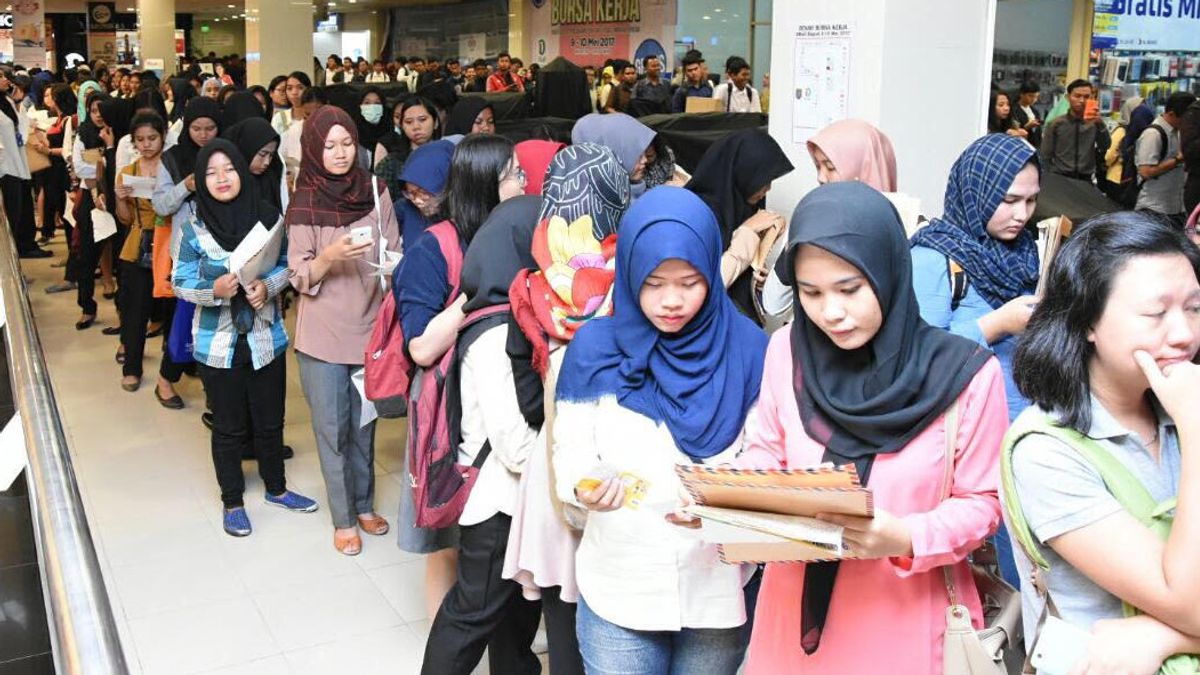JAKARTA - The large productive age population growth (demographic bonus) can bring benefits because it can be the motor that drives the economy. However, this can turn into a social problem if it is not balanced with job opportunities.
Executive Director of the Institute for Development of Economics and Finance (Indef) Enny Sri Hartati said the government needed to open the widest possible job opportunities to reduce the risk of social problems in society.
"This is very important because if the unemployment rate goes up, while they don't have a job, social problems such as crime and so on will arise," she told VOI recently.
Enny added that employment means giving people the ability to remain consumptive through the income they receive. If this scenario occurs, demand will grow, which will lead to an increase in output in shaping GDP.
“The most likely sector is labor-intensive because usually the lower class people who enter this sector dominate in Indonesia. This group, if they get the money, must be used to buy basic daily needs. So the economy can continue to rotate and consumption will not decline," she said.
Likewise, Member of Commission IV DPR RI Hermanto reminded that the demographic bonus that is being experienced by Indonesia needs to be optimized so that it can generate productive forces to support the economy. One of the things he proposed was to direct young people to become agents of labor regeneration in the agricultural sector.
According to him, almost all productive sectors are under pressure due to the COVID-19 pandemic, but not for the agricultural sector, which continues to grow positively.
“This business is actually quite promising. There are even millennials who can earn up to hundreds of millions per month,” he said Monday, February 8 as quoted by Antara.
Demographic bonus issue
Quoting the Ministry's report, this demographic bonus can give a good signal, but if it is not utilized it will be a loss that will have an impact on poverty. The reason is the imbalance between the population and available employment opportunities, the amount of food and nutrition, and the unequal opportunities for education.
As a result, the gap between the rich and the poor, as measured by the Gini ratio, will widen. For this reason, the role of government is needed in controlling the rate of population growth.
For information, the Central Statistics Agency (BPS) on November 10, 2020, stated that as of August 2020 the number of unemployed people in Indonesia had risen to 9.77 million people or the equivalent of 7.07 percent of the total workforce in this country which amounted to 138.22 million people.
Meanwhile, the results of the 2020 population census reveal that Indonesia's population reaches 270 million. From this number, 70 percent of them are of the productive age population or nearly 190 million people.
BPS itself predicts that Indonesia's population growth during the peak period of the 2030 demographic bonus is around 294 million to 300 million.
If the government does not make efforts to increase employment, it is estimated that there will be 21 million people who are unemployed by 2030. This number has the potential to cause social problems if the government does not find accurate solutions in the labor sector.
Job Creation Law
Implicitly, the government has actually measured the negative impact of the demographic bonus if it cannot be maximized optimally. This strategic step was then accommodated by the state through the Job Creation Law which was intended to expand job opportunities for the Indonesian people and make it easier for business people to open business activities in the country.
Citing a broadcast by the Coordinating Ministry for the Economy, the government has set several targets in the Job Creation Law, including creating as many as 3 million jobs every year. To note, every year there are 2.4 million people entering the workforce.
If unemployment in 2020 amounts to 9 million people and added with a new workforce each year of 2.4 million people, then the Job Creation Law will be able to eliminate unemployment by 2035. This means that Indonesia has passed the peak period of the demographic bonus according to BPS.
However, it must be remembered that this simple calculation does not include the annual growth in unemployment and the number of productive age entering retirement.
The English, Chinese, Japanese, Arabic, and French versions are automatically generated by the AI. So there may still be inaccuracies in translating, please always see Indonesian as our main language. (system supported by DigitalSiber.id)













